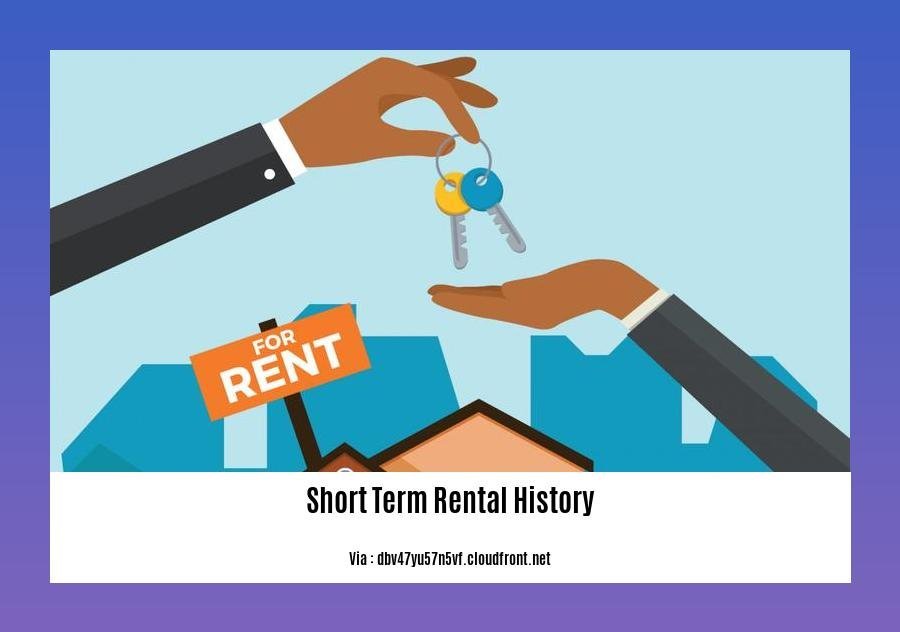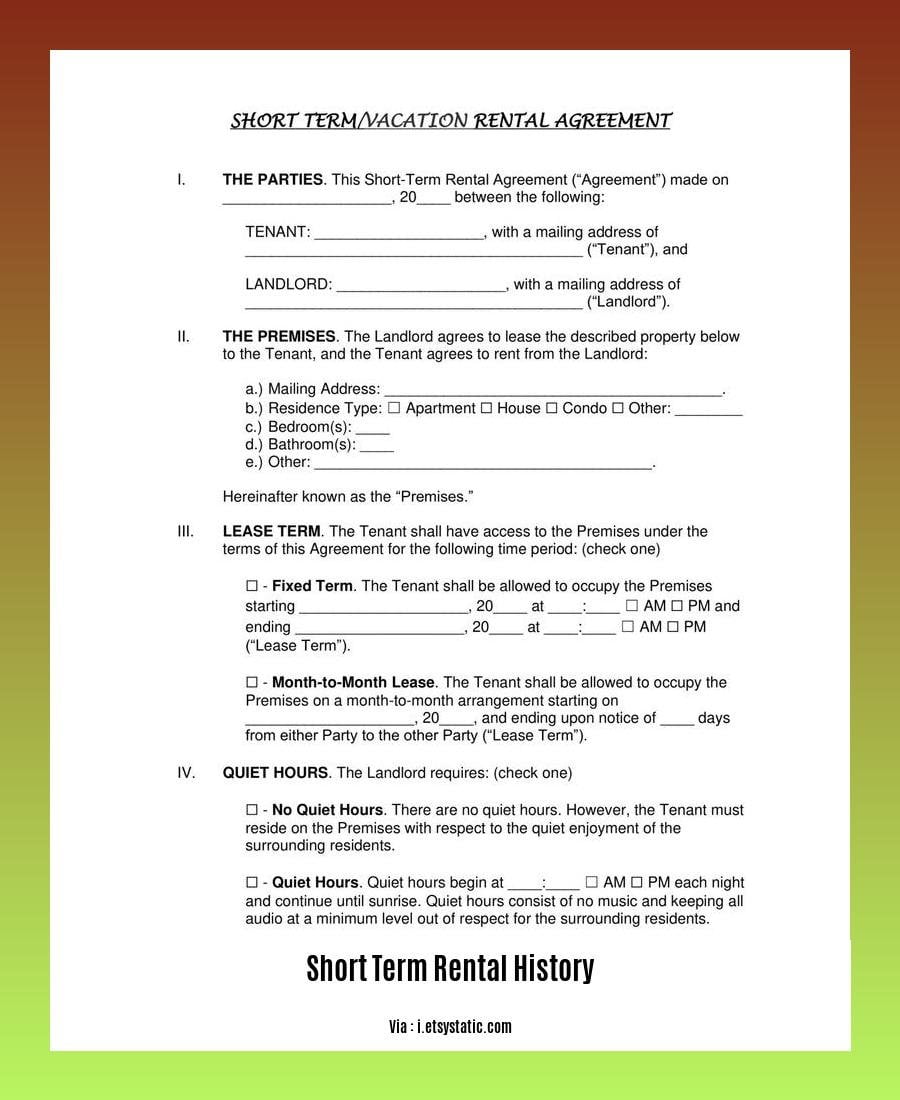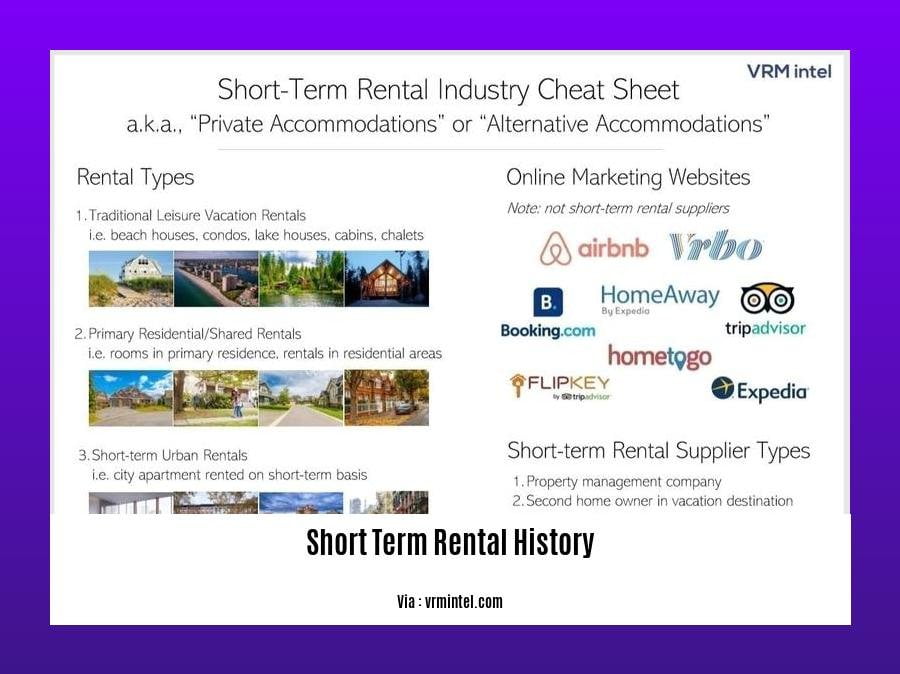Dive into “The Evolution of Short-Term Rentals: A Historical Perspective” and uncover the fascinating journey of this industry. Explore its humble beginnings, legal battles, and the transformative impact it has had on global tourism and accommodation.
Key Takeaways:
- Short-term rentals have gained popularity due to home-sharing platforms like Airbnb.
- VRBO pioneered online vacation rental listings in 1995.
- Airbnb’s innovation made home-sharing more accessible and profitable.
- Competitors have emerged, diversifying the short-term rental market.
- The industry is projected to expand as travelers value flexibility and cost-effectiveness.
A Brief History of Short-Term Rentals

The Pre-Airbnb Era:
Before the internet, short-term rentals existed but were less common and harder to arrange. People mainly rented out their homes through word-of-mouth or local agencies. In the mid-1990s, VRBO (Vacation Rentals by Owner) emerged as the first online platform dedicated to vacation rentals.
The Airbnb Revolution:
Airbnb was founded in 2008 and significantly disrupted the industry. It made home-sharing more accessible and convenient by connecting hosts and guests online. Airbnb’s rapid growth popularized short-term rentals, appealing to travelers seeking unique and affordable accommodation.
Post-Airbnb Landscape:
Airbnb’s success led to the emergence of competitors like Vrbo, HomeAway, and Booking.com. Today, the short-term rental market is highly competitive, with various platforms offering diverse options for travelers.
Regulatory Evolution:
As the industry grew, cities and governments recognized the need for regulation. Regulations vary widely, but many have focused on zoning restrictions, safety standards, and tax compliance. Some cities have also implemented licensing requirements for short-term rentals.
Future Trends:
The future of the short-term rental industry appears bright. Travelers continue to seek more flexible and cost-effective accommodation options, and the rise of remote work makes it easier for hosts to offer longer-term stays. Technology is also expected to play a significant role in streamlining booking processes and enhancing the guest experience.
Discover the fascinating history of vacation lets, from their humble beginnings to their modern-day popularity. Get a glimpse into the holiday rentals history and the evolution of vacation lodging throughout the centuries, showcasing how they have become an integral part of our travel experiences.
Legal and regulatory challenges

Short-term rentals have become increasingly popular in recent years, but they have also faced a growing number of legal and regulatory challenges.
One of the most common challenges is the issue of zoning. Many cities have zoning laws that prohibit short-term rentals in certain areas. This can make it difficult for property owners to rent out their homes on a short-term basis.
Another challenge is the issue of safety. Short-term rentals are often rented out to strangers, which can raise concerns about safety for both the guests and the surrounding community. Some cities have responded to these concerns by requiring short-term rental owners to obtain a license or permit.
Taxation is another issue that short-term rental owners face. Many cities have begun to tax short-term rentals, which can add to the cost of renting out a property.
In addition to these challenges, short-term rental owners may also face discrimination from landlords and homeowners associations. Some landlords and HOAs have banned short-term rentals altogether, while others have imposed restrictions on them.
Key Takeaways:
- Regulation of short-term rentals has led to a decline in Airbnb listings (50%) and a decrease in house prices and rents (2%).
- Socioeconomic disruptions caused by short-term rentals have triggered regulatory measures from outright bans to taxation.
- Concerns include nuisance, gentrification, and the impact on the hotel industry.
- Home-sharing platforms like Airbnb facilitate short-term rentals but also raise concerns regarding illegal listings and regulatory enforcement.
Citation:
- The design and effects of short-term rental regulation
Technological Advancements and Innovation
In the ever-evolving landscape of short-term rentals, technology has been the driving force behind its remarkable growth and transformation. Let’s dive into some key technological advancements that have shaped this industry:
- VRBO (1995): The pioneer of online platforms, VRBO paved the way for seamless bookings of vacation rentals.
- Airbnb (2008): A game-changer, Airbnb revolutionized short-term rentals by introducing home-sharing, making it more accessible.
- Mobile Applications: The convenience of booking and managing short-term rentals on the go has been made possible by smartphone apps.
- Automated Check-Ins: Gone are the days of key exchanges; smart locks and self-check-in systems have streamlined the guest experience.
- Virtual Reality Tours: Potential guests can now virtually tour properties from the comfort of their couch, enhancing booking decisions.
- AI-Powered Recommendations: Platforms leverage AI algorithms to personalize accommodation recommendations based on guest preferences.
Key Takeaways:
- Technological advancements have revolutionized the accessibility and convenience of short-term rentals.
- Mobile apps, automated check-ins, and virtual reality tours enhance the guest experience.
- AI-powered recommendations personalize accommodation options.
Most Relevant URL Source:
- Forbes: The Growth Of The Short-Term Rental Industry And Technology’s Impact
Future trends and industry predictions
The future of short-term rentals appears bright, with the industry expected to continue expanding in the coming years.
Key Takeaways:
Increase in Short-term Rental Supply
Growing popularity of platforms like Airbnb and Vrbo fuels supply expansion.
Travelers seek flexible and affordable accommodation options.
Market Expansion and Growth
Market expected to reach new heights in 2024 and beyond.
- Strong growth in key markets continues.
Vacation rental supply also on the rise.
Technological Advancements
Enhanced booking processes and guest experiences.
Smart home technology and digital assistants integrate into short-term rentals.
Regulatory Evolution
Ongoing regulation aims to balance industry growth with community concerns.
Governments seek to address issues such as noise, safety, and tax compliance.
Changing Consumer Preferences
Travelers prioritize experiences over traditional hotel stays.
Demand for unique and authentic accommodations grows.
Sustainability
Increase in eco-friendly practices in short-term rentals.
- Guests seek environmentally responsible options.
Most Relevant URL Source:
- Short-term Rental Market Growth: Trends and Predictions for 2024












